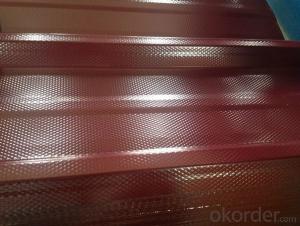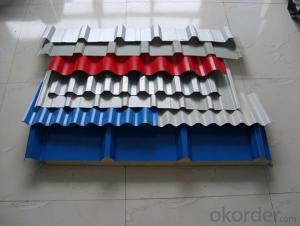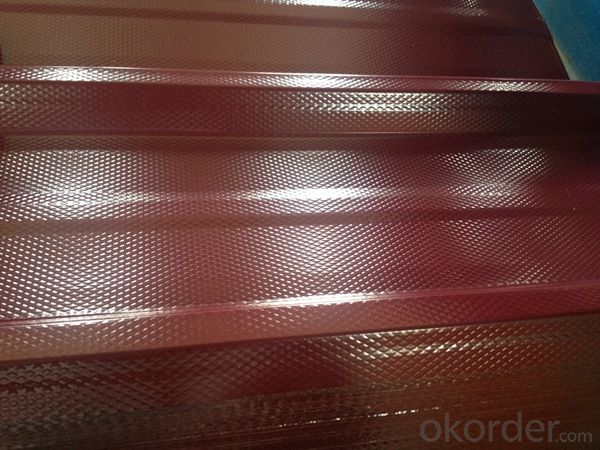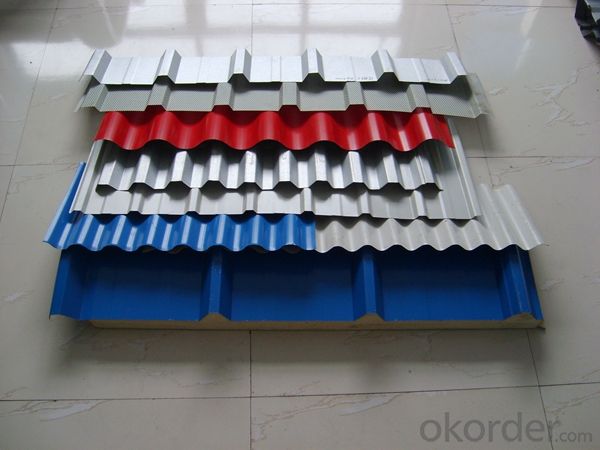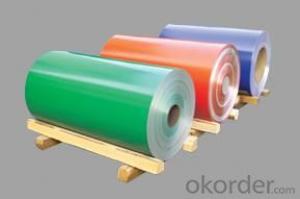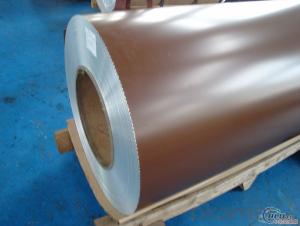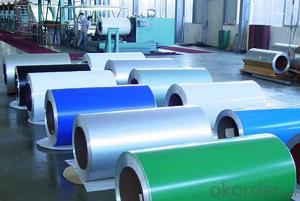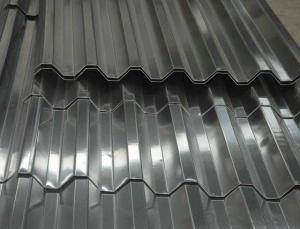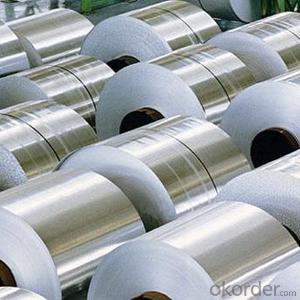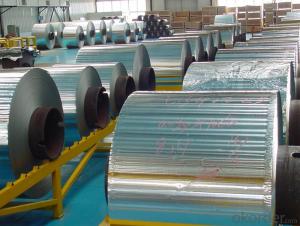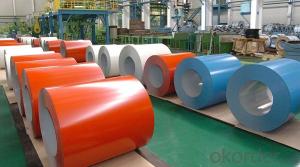Aluminum Coils/Sheets - Color Coating Aluminum Coil 3003 for Roofing Decoration
- Loading Port:
- Shanghai
- Payment Terms:
- TT OR LC
- Min Order Qty:
- 5 m.t.
- Supply Capability:
- 100000 m.t./month
OKorder Service Pledge
OKorder Financial Service
You Might Also Like
Specification
1. Specification of Color Coating Aluminium Coil 3003 for Roofing Decoration
Name | 3003 Aluminum Coil |
Brand | CNBM |
Alloy | 1100H-18, 3003-H24,3003-H26,3005-H26,8011,3004,3105,5005,etc. |
Thickness | 0.1~1.5mm |
Width | <2000mm< span=""> |
MOQ | 1 MT |
Coating finish | Brushed, drawing, embossed, printing |
Color | As to code RAL |
Surface | Embossed,Mill Finish,Coated,Brushed |
Gloss | 10-90%(EN ISO-2813:1994) |
Total coating thick | PVDF27 ~35micron |
Polyester18~27micron(EN ISO-2360:1995) | |
Coating hardness | 2H |
Adhesion | 5B (EN ISO-2409:1994) |
Impact resistance | No cracking and peeling (A.S.T.M D2794-1993) |
Flexibility (T-bend) | 0T- 2T |
MEK resistance | 100 |
Certification | ISO9001:2000, CE, SGS |
Coil's standard diameter | 1100mm |
Inner Diameter | 405mm/505mm |
Coil's standard weight | 1MT - 2MT |
2. Application of Color Coating Aluminium Coil 3003 for Roofing Decoration
(1).Interior: wall cladding, ceilings, bathrooms, kitchens and balconies, shutters, doors...
(2).Exterior: wall cladding, facades, roofing, canopies, tunnels,column covers , renovations...
(3).Advertisement: display platforms, signboards, fascia, shop fronts...
3. Feature of Color Coating Aluminium Coil 3003 for Roofing Decoration
*Such coil is specially designed to replace aluminum ingot, due to the high export tax of aluminum ingot, the coil has better price than ingot.
*This type of coil can fit customer's remelting furnace just like ingot, no need to make any change to the production line that was previously used for ingot. The standard coil size and weight is very suitable for the feed gate of furnace.
*This type of coil causes less material wastage than ingot when remelted.
*Our coil is made directly from ore, no need to go though the ingot making process, quality is much better than other suppliers who use ingot scrap to make coil.
Be free from Oil Stain, Dent, Inclusion, Scratches, Stain, Oxide Dicoloration, Breaks, Corrosion, Roll Marks, Dirt Streaks and other defect which will interfere with use
4. Certificate:
SGS and ROHS(if client request, paid by client), MTC(plant provided), Certificate of Origin(FORM A, FORM E, CO), Bureau Veritas and SGS (if client request, paid by client), CIQS certificate
5. Image of Color Coating Aluminium Coil 3003 for Roofing Decoration
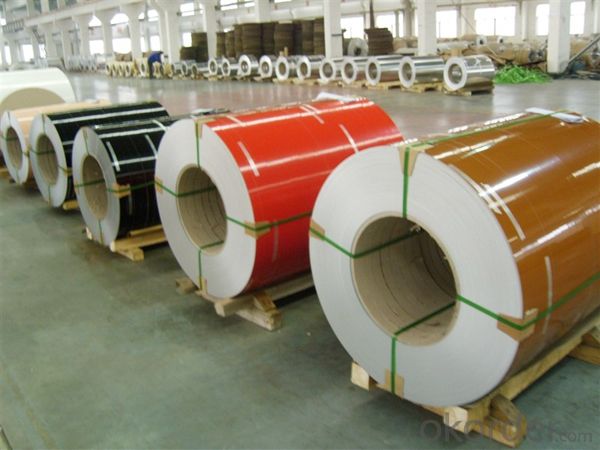
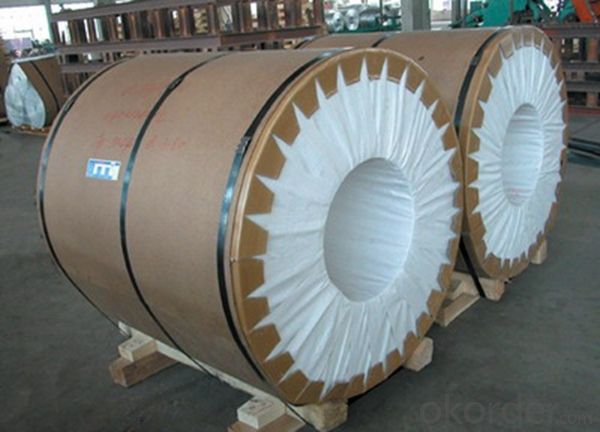
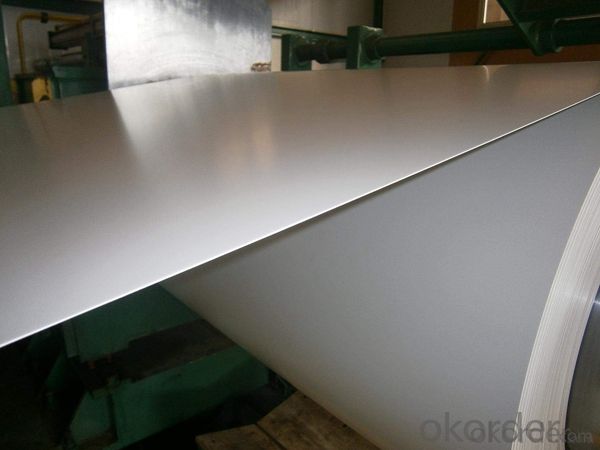
6. Package and shipping of Color Coating Aluminium Coil 3003 for Roofing Decoration
eye to wall
eye to the wall
with wood pallet (wooded case also available)
7. FAQ
1) What is the delivery time?
Dpends on actual order, around 20 to 35 days
2)What is the QC system:
We have QC staff of 20 persons and advanced equipment, each production is with MTC traced from Aluminum ingot lot.
3) What market do you mainly sell to?
Australia, America, Asia, Middle East, Western Europe, Africa etc
- Q: What is the maximum coil diameter for aluminum coils?
- The maximum coil diameter for aluminum coils can vary depending on the specific application and manufacturing process. However, in general, the maximum coil diameter for aluminum coils typically ranges from 60 inches (152.4 cm) to 120 inches (304.8 cm). This diameter limit is determined by factors such as the size of the production equipment, the thickness and width of the aluminum sheet being processed, and the handling capabilities of the facility. It is important to consult with the manufacturer or supplier to determine the specific maximum coil diameter for a particular aluminum coil product.
- Q: How are aluminum coils priced in the market?
- Aluminum coils are typically priced in the market based on factors such as the current market demand and supply, the cost of raw materials, production and manufacturing costs, transportation costs, and any additional factors that may affect the overall pricing.
- Q: How do aluminum coils contribute to the aesthetics of architectural designs?
- Aluminum coils play a significant role in enhancing the aesthetics of architectural designs. One of the main reasons is their versatility in terms of shape and size. Aluminum coils can be easily formed into various shapes, making them suitable for a wide range of architectural applications. The lightweight nature of aluminum coils also contributes to their aesthetic appeal. They provide a sleek and modern look to buildings, especially when used in cladding or façade systems. The use of aluminum coils can create a visually pleasing and contemporary appearance, adding a touch of elegance to the overall design. Additionally, aluminum coils offer a wide range of color options, thanks to their ability to be coated or painted. This allows architects and designers to choose from an extensive palette of colors, enabling them to match the building's exterior with its surroundings or to create a specific mood or theme. The color choices available for aluminum coils provide endless possibilities for customization and creativity in architectural design. Furthermore, aluminum coils are highly durable and resistant to corrosion, making them suitable for long-lasting architectural applications. Their ability to withstand harsh weather conditions ensures that the building's aesthetics remain intact over time. This durability factor is essential in maintaining the visual appeal of architectural designs, as it prevents the need for frequent repairs or replacements. In summary, aluminum coils contribute to the aesthetics of architectural designs through their versatility, lightweight nature, color options, and durability. Their ability to be shaped into various forms, combined with a wide range of color choices, allows architects and designers to create visually stunning and customized buildings. The sleek and modern appearance of aluminum coils adds a touch of elegance to architectural designs, enhancing their overall aesthetics.
- Q: Is it possible to customize the dimensions of aluminum coils?
- Yes, it is possible to customize the dimensions of aluminum coils. Aluminum coils can be cut and shaped according to specific requirements and dimensions based on the application they are intended for. Customization allows for flexibility in design and ensures the aluminum coils meet the specific needs of the project.
- Q: What specific tools are necessary for handling and working with aluminum coils?
- <p>When working with aluminum coils, there are several special tools that may be required. These include cutting tools designed for metal, such as metal shears or a bandsaw with a metal cutting blade, to cut the coils without damaging the material. A coil car or lifting equipment is necessary for safely moving and positioning heavy coils. Additionally, a coil leveler may be needed to straighten and flatten the coils for processing. Safety equipment such as gloves and goggles is also essential to protect against sharp edges and flying debris. It's important to use tools that are suitable for the specific aluminum alloy and thickness to ensure efficient and safe handling.</p>
- Q: Can aluminum coils be used for HVAC ducting?
- Yes, aluminum coils can be used for HVAC ducting. Aluminum is a common material used in HVAC systems due to its durability, lightweight nature, and resistance to corrosion. Aluminum coils are often used to manufacture HVAC ductwork as they can effectively distribute air throughout the system while maintaining its structural integrity. Additionally, aluminum coils are highly efficient in transferring heat, allowing for more efficient cooling and heating processes within the HVAC system. Overall, aluminum coils are a suitable choice for HVAC ducting due to their numerous benefits and ability to meet the requirements of a well-functioning HVAC system.
- Q: Can aluminum coils be anodized for enhanced durability?
- Indeed, it is possible to anodize aluminum coils in order to enhance their durability. Anodization involves the creation of a layer of aluminum oxide on the surface of the aluminum, resulting in increased resistance to corrosion, wear, and scratches. This layer also offers added protection against UV rays and harsh environmental conditions. By subjecting aluminum coils to anodization, they become more resilient and capable of enduring extended use in a variety of industries, including construction, automotive, and electronics. Moreover, anodized aluminum coils can be further enhanced with additional coatings or finishes to improve their appearance and provide additional protection. Overall, anodizing aluminum coils is a widely employed and efficacious technique for boosting their durability and extending their lifespan.
- Q: Does anyone know if aluminum skateboards are good?
- I haven't seen one since the old QuickSilver-Silver Surfer(circa 1979). They look great, but they become useless when scratched. Which means....you can't really use them for anything. They're not as flexible as wood....and.......Wait until you get hit in the shin with an aluminum skateboard. Aircraft metal my(explicative deleted). My guess is they're inexpensive because they're trying to get the word out. The company owners probably no very little about skateboarding.
- Q: Are aluminum coils suitable for electrical transformer applications?
- Yes, aluminum coils are suitable for electrical transformer applications. They offer several advantages such as lower weight, better thermal conductivity, and cost-effectiveness compared to copper coils. Additionally, aluminum coils have good electrical conductivity and can withstand high temperatures, making them a viable option for transformer applications.
- Q: Can aluminum coils be used for solar panel applications?
- Solar panel applications can utilize aluminum coils, which are lightweight and durable materials commonly employed in solar panel construction. Aluminum, an excellent conductor of electricity, is ideal for capturing and conducting solar energy. These coils can serve as backing materials for solar panels, offering structural support and aiding in heat dissipation. Furthermore, aluminum possesses good corrosion resistance, a crucial characteristic for solar panels exposed to diverse weather conditions. Ultimately, the strength, conductivity, and corrosion resistance of aluminum coils render them a favored choice for solar panel applications.
Send your message to us
Aluminum Coils/Sheets - Color Coating Aluminum Coil 3003 for Roofing Decoration
- Loading Port:
- Shanghai
- Payment Terms:
- TT OR LC
- Min Order Qty:
- 5 m.t.
- Supply Capability:
- 100000 m.t./month
OKorder Service Pledge
OKorder Financial Service
Similar products
Hot products
Hot Searches
Related keywords
